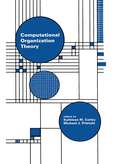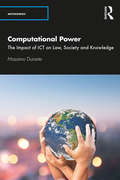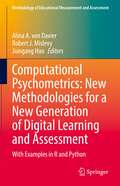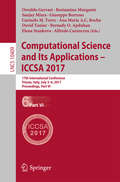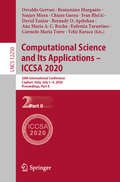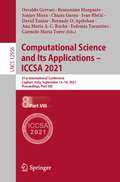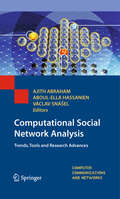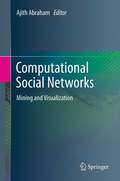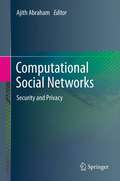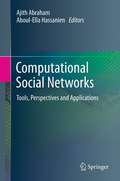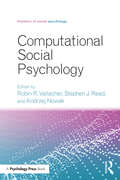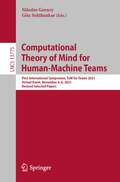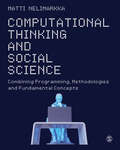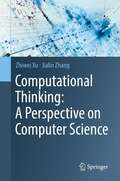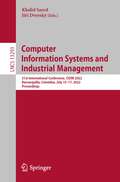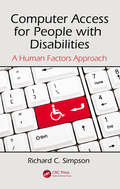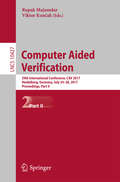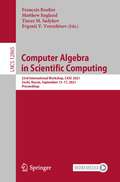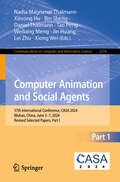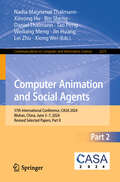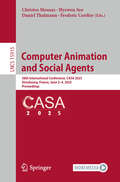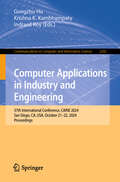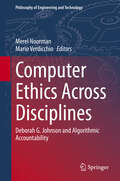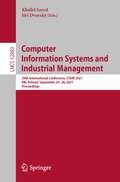- Table View
- List View
Computational Organization Theory
by Kathleen M. Carley Michael J. PrietulaThis volume represents an advance in our understanding of how to represent and reason about organizational phenomena. Although organizational theorists have long grappled with the complexities of adaptive agents, ecological systems, and non-linear relations among the basic elements of organizational design, they have not, until recently, had the tools to grapple with these complex relationships. Recent advances in logic, symbolic programming, network analysis, and computer technology have made possible a series of tools that can be used to understand the complexities of organizational behavior. New computational techniques make it possible to develop and test more realistic models of organizational behavior. This volume offers examples of this new breed of models, and provides insight into how these advances and techniques can be used to extend our theoretical understanding of organizations. Authored by leading researchers in the area of computational organization theory, the various chapters demonstrate the value of computational analysis for organizational theory and advance our understanding of the relationship between organizational design and performance. This book contains both theoretical and methodological contributions that enable organizational theorists to use computational and mathematical techniques to systematically address the complex relationships that underlie organizational life. It also presents new -- or sometimes, renewed -- approaches on how to conduct organizational research from multiple formal perspectives including: simulation, numerical analysis, symbolic logic, mathematical modeling, and graph theory.
Computational Power: The Impact of ICT on Law, Society and Knowledge (Antinomies)
by Massimo DuranteWe delegate more and more decisions and tasks to artificial agents, machine-learning mechanisms, and algorithmic procedures or, in other words, to computational systems. Not that we are driven by powerful ambitions of colonizing the Moon, replacing humans with legions of androids, creating sci-fi scenarios à la Matrix or masterminding some sort of Person of Interest-like Machine. No, the current digital revolution based on computational power is chiefly an everyday revolution. It is therefore that much more profound, unnoticed and widespread, for it affects our customary habits and routines and alters the very texture of our day-to-day lives. This opens a precise line of inquiry, which constitutes the basic thesis of the present text: our computational power is exercised by trying to adapt not just the world but also our representation of reality to how computationally based ICTs work. The impact of this technology is such that it does not leave things as they are: it changes the nature of agents, habits, objects and institutions and hence it subverts the existing order, without necessarily generating a new one. I argue that this power is often not distributed in an egalitarian manner but, on the contrary, is likely to result in concentrations of wealth, in dominant positions or in unjust competitive advantages. This opens up a struggle, with respect to which the task of reaffirming the fundamental values, the guiding principles, the priorities and the rules of the game, which can transform, or attempt to transform, a fierce confrontation between enemies in a fair competition between opponents rests on us.
Computational Psychometrics: With Examples in R and Python (Methodology of Educational Measurement and Assessment)
by Robert J. Mislevy Alina A. von Davier Jiangang HaoThis book defines and describes a new discipline, named “computational psychometrics,” from the perspective of new methodologies for handling complex data from digital learning and assessment. The editors and the contributing authors discuss how new technology drastically increases the possibilities for the design and administration of learning and assessment systems, and how doing so significantly increases the variety, velocity, and volume of the resulting data. Then they introduce methods and strategies to address the new challenges, ranging from evidence identification and data modeling to the assessment and prediction of learners’ performance in complex settings, as in collaborative tasks, game/simulation-based tasks, and multimodal learning and assessment tasks.Computational psychometrics has thus been defined as a blend of theory-based psychometrics and data-driven approaches from machine learning, artificial intelligence, and data science. All these together provide a better methodological framework for analysing complex data from digital learning and assessments. The term “computational” has been widely adopted by many other areas, as with computational statistics, computational linguistics, and computational economics. In those contexts, “computational” has a meaning similar to the one proposed in this book: a data-driven and algorithm-focused perspective on foundations and theoretical approaches established previously, now extended and, when necessary, reconceived. This interdisciplinarity is already a proven success in many disciplines, from personalized medicine that uses computational statistics to personalized learning that uses, well, computational psychometrics. We expect that this volume will be of interest not just within but beyond the psychometric community.In this volume, experts in psychometrics, machine learning, artificial intelligence, data science and natural language processing illustrate their work, showing how the interdisciplinary expertise of each researcher blends into a coherent methodological framework to deal with complex data from complex virtual interfaces. In the chapters focusing on methodologies, the authors use real data examples to demonstrate how to implement the new methods in practice. The corresponding programming codes in R and Python have been included as snippets in the book and are also available in fuller form in the GitHub code repository that accompanies the book.
Computational Science and Its Applications – ICCSA 2017: 17th International Conference, Trieste, Italy, July 3-6, 2017, Proceedings, Part VI (Lecture Notes in Computer Science #10409)
by Osvaldo Gervasi, Beniamino Murgante, Sanjay Misra, Giuseppe Borruso, Carmelo M. Torre, Ana Maria A.C. Rocha, David Taniar, Bernady O. Apduhan, Elena Stankova and Alfredo CuzzocreaThe six-volume set LNCS 10404-10409 constitutes the refereed proceedings of the 17th International Conference on Computational Science and Its Applications, ICCSA 2017, held in Trieste, Italy, in July 2017. The 313 full papers and 12 short papers included in the 6-volume proceedings set were carefully reviewed and selected from 1052 submissions. Apart from the general tracks, ICCSA 2017 included 43 international workshops in various areas of computational sciences, ranging from computational science technologies to specific areas of computational sciences, such as computer graphics and virtual reality. Furthermore, this year ICCSA 2017 hosted the XIV International Workshop On Quantum Reactive Scattering. The program also featured 3 keynote speeches and 4 tutorials.
Computational Science and Its Applications – ICCSA 2020: 20th International Conference, Cagliari, Italy, July 1–4, 2020, Proceedings, Part II (Lecture Notes in Computer Science #12250)
by Osvaldo Gervasi Beniamino Murgante Sanjay Misra Ana Maria A. C. Rocha David Taniar Bernady O. Apduhan Eufemia Tarantino Chiara Garau Ivan Blečić Carmelo Maria Torre Yeliz KaracaThe seven volumes LNCS 12249-12255 constitute the refereed proceedings of the 20th International Conference on Computational Science and Its Applications, ICCSA 2020, held in Cagliari, Italy, in July 2020. Due to COVID-19 pandemic the conference was organized in an online event.Computational Science is the main pillar of most of the present research, industrial and commercial applications, and plays a unique role in exploiting ICT innovative technologies.The 466 full papers and 32 short papers presented were carefully reviewed and selected from 1450 submissions. Apart from the general track, ICCSA 2020 also include 52 workshops, in various areas of computational sciences, ranging from computational science technologies, to specific areas of computational sciences, such as software engineering, security, machine learning and artificial intelligence, blockchain technologies, and of applications in many fields.
Computational Science and Its Applications – ICCSA 2021: 21st International Conference, Cagliari, Italy, September 13–16, 2021, Proceedings, Part VIII (Lecture Notes in Computer Science #12956)
by Osvaldo Gervasi Beniamino Murgante Sanjay Misra Ana Maria A. C. Rocha David Taniar Bernady O. Apduhan Eufemia Tarantino Chiara Garau Ivan Blečić Carmelo Maria TorreThe ten-volume set LNCS 12949 – 12958 constitutes the proceedings of the 21st International Conference on Computational Science and Its Applications, ICCSA 2021, which was held in Cagliari, Italy, during September 13 – 16, 2021. The event was organized in a hybrid mode due to the Covid-19 pandemic.The 466 full and 18 short papers presented in these proceedings were carefully reviewed and selected from 1588 submissions. Part VIII of the set includes the proceedings of the following workshops: International Workshop on Privacy in the Cloud/Edge/IoT World (PCEIoT 2021); International Workshop on Processes, methods and tools towards RE-Silient cities and cultural heritage prone to SOD and ROD disasters (RES 2021); International Workshop on Risk, resilience and sustainability in the efficient management of water resources: approaches, tools, methodologies and multidisciplinary integrated applications (RRS 2021); International Workshop on Scientific Computing Infrastructure (SCI 2021); International Workshop on Smart Cities and User Data Management (SCIDAM 2021).
Computational Social Network Analysis: Trends, Tools and Research Advances (Computer Communications and Networks)
by Ajith Abraham Aboul-Ella Hassanien Vaclav SnášelSocial networks provide a powerful abstraction of the structure and dynamics of diverse kinds of people or people-to-technology interaction. Web 2.0 has enabled a new generation of web-based communities, social networks, and folksonomies to facilitate collaboration among different communities. This unique text/reference compares and contrasts the ethological approach to social behavior in animals with web-based evidence of social interaction, perceptual learning, information granulation, the behavior of humans and affinities between web-based social networks. An international team of leading experts present the latest advances of various topics in intelligent-social-networks and illustrates how organizations can gain competitive advantages by applying the different emergent techniques in real-world scenarios. The work incorporates experience reports, survey articles, and intelligence techniques and theories with specific network technology problems. Topics and Features: Provides an overview social network tools, and explores methods for discovering key players in social networks, designing self-organizing search systems, and clustering blog sites, surveys techniques for exploratory analysis and text mining of social networks, approaches to tracking online community interaction, and examines how the topological features of a system affects the flow of information, reviews the models of network evolution, covering scientific co-citation networks, nature-inspired frameworks, latent social networks in e-Learning systems, and compound communities, examines the relationship between the intent of web pages, their architecture and the communities who take part in their usage and creation, discusses team selection based on members' social context, presents social network applications, including music recommendation and face recognition in photographs, explores the use of social networks in web services that focus on the discovery stage in the life cycle of these web services. This useful and comprehensive volume will be indispensible to senior undergraduate and postgraduate students taking courses in Social Intelligence, as well as to researchers, developers, and postgraduates interested in intelligent-social-networks research and related areas.
Computational Social Networks: Mining and Visualization
by Ajith AbrahamThis book is the third of three volumes that illustrate the concept of social networks from a computational point of view. The book contains contributions from a international selection of world-class experts, with a specific focus on knowledge discovery and visualization of complex networks (the other two volumes review Tools, Perspectives, and Applications, and Security and Privacy in CSNs). Topics and features: presents the latest advances in CSNs, and illustrates how organizations can gain a competitive advantage from a better understanding of complex social networks; discusses the design and use of a wide range of computational tools and software for social network analysis; describes simulations of social networks, and the representation and analysis of social networks, highlighting methods for the data mining of CSNs; provides experience reports, survey articles, and intelligence techniques and theories relating to specific problems in network technology.
Computational Social Networks: Security and Privacy
by Ajith AbrahamThis book is the second of three volumes that illustrate the concept of social networks from a computational point of view. The book contains contributions from a international selection of world-class experts, concentrating on topics relating to security and privacy (the other two volumes review Tools, Perspectives, and Applications, and Mining and Visualization in CSNs). Topics and features: presents the latest advances in security and privacy issues in CSNs, and illustrates how both organizations and individuals can be protected from real-world threats; discusses the design and use of a wide range of computational tools and software for social network analysis; describes simulations of social networks, and the representation and analysis of social networks, with a focus on issues of security, privacy, and anonymization; provides experience reports, survey articles, and intelligence techniques and theories relating to specific problems in network technology.
Computational Social Networks: Tools, Perspectives and Applications
by Ajith Abraham Aboul-Ella HassanienThis book is the first of three volumes that illustrate the concept of social networks from a computational point of view. The book contains contributions from a international selection of world-class experts, with a specific focus on practical tools, applications, and open avenues for further research (the other two volumes review issues of Security and Privacy, and Mining and Visualization in CSNs). Topics and features: presents the latest advances in CSNs, and illustrates how organizations can gain a competitive advantage by applying these ideas in real-world scenarios; discusses the design and use of a wide range of computational tools and software for social network analysis; describes simulations of social networks, the representation and analysis of social networks, and the use of semantic networks in knowledge discovery and visualization; provides experience reports, survey articles, and intelligence techniques and theories relating to specific problems in network technology.
Computational Social Psychology (Frontiers of Social Psychology)
by Robin R. Vallacher; Stephen J. Read; Andrzej NowakComputational Social Psychology showcases a new approach to social psychology that enables theorists and researchers to specify social psychological processes in terms of formal rules that can be implemented and tested using the power of high speed computing technology and sophisticated software. This approach allows for previously infeasible investigations of the multi-dimensional nature of human experience as it unfolds in accordance with different temporal patterns on different timescales. In effect, the computational approach represents a rediscovery of the themes and ambitions that launched the field over a century ago. The book brings together social psychologists with varying topical interests who are taking the lead in this redirection of the field. Many present formal models that are implemented in computer simulations to test basic assumptions and investigate the emergence of higher-order properties; others develop models to fit the real-time evolution of people’s inner states, overt behavior, and social interactions. Collectively, the contributions illustrate how the methods and tools of the computational approach can investigate, and transform, the diverse landscape of social psychology.
Computational Theory of Mind for Human-Machine Teams: First International Symposium, ToM for Teams 2021, Virtual Event, November 4–6, 2021, Revised Selected Papers (Lecture Notes in Computer Science #13775)
by Gita Sukthankar Nikolos GurneyThis book constitutes the proceedings of the First International Symposium, ToM for Teams 2021, held in Washington, DC, USA, during November 4–6, 2021, Each chapter in this section tackles a different aspect of AI representing the thoughts and beliefs of human agents. The work presented herein represents our collective efforts to better understand ToM, develop AI with ToM capabilities (ASI), and study how to integrate such systems into human teams.
Computational Thinking and Social Science: Combining Programming, Methodologies and Fundamental Concepts
by Matti NelimarkkaWhilst providing a fundamental understanding of computational social science, this book delves into the tools and techniques used to build familiarity with programming and gain context into how, why and when they are introduced. The overall focus is on helping you understand and design computational social science research, alongside delving into hands-on coding and technical instruction. Key features include: Further reading Exercises accompanied by sample code Programming examples in Scratch, Python and R Key concepts Chapter summaries With experience in course design and teaching, Matti Nelimarkka has a deep understanding of learning techniques within computational social sciences, with the main aim of blending researching, thinking and designing together to gain a grounded foundation for coding, programming, methodologies and key concepts.
Computational Thinking and Social Science: Combining Programming, Methodologies and Fundamental Concepts
by Matti NelimarkkaWhilst providing a fundamental understanding of computational social science, this book delves into the tools and techniques used to build familiarity with programming and gain context into how, why and when they are introduced. The overall focus is on helping you understand and design computational social science research, alongside delving into hands-on coding and technical instruction. Key features include: Further reading Exercises accompanied by sample code Programming examples in Scratch, Python and R Key concepts Chapter summaries With experience in course design and teaching, Matti Nelimarkka has a deep understanding of learning techniques within computational social sciences, with the main aim of blending researching, thinking and designing together to gain a grounded foundation for coding, programming, methodologies and key concepts.
Computational Thinking: A Perspective on Computer Science
by Jialin Zhang Zhiwei XuThis textbook is intended as a textbook for one-semester, introductory computer science courses aimed at undergraduate students from all disciplines. Self-contained and with no prerequisites, it focuses on elementary knowledge and thinking models. The content has been tested in university classrooms for over six years, and has been used in summer schools to train university and high-school teachers on teaching introductory computer science courses using computational thinking. This book introduces computer science from a computational thinking perspective. In computer science the way of thinking is characterized by three external and eight internal features, including automatic execution, bit-accuracy and abstraction. The book is divided into chapters on logic thinking, algorithmic thinking, systems thinking, and network thinking. It also covers societal impact and responsible computing material – from ICT industry to digital economy, from the wonder of exponentiation to wonder of cyberspace, and from code of conduct to best practices for independent work. The book’s structure encourages active, hands-on learning using the pedagogic tool Bloom's taxonomy to create computational solutions to over 200 problems of varying difficulty. Students solve problems using a combination of thought experiment, programming, and written methods. Only 300 lines of code in total are required to solve most programming problems in this book.
Computer Information Systems and Industrial Management: 21st International Conference, CISIM 2022, Barranquilla, Colombia, July 15–17, 2022, Proceedings (Lecture Notes in Computer Science #13293)
by Khalid Saeed Jiří DvorskýThis book constitutes the proceedings of the 21st International Conference on Computer Information Systems and Industrial Management Applications, CISIM 2022, held in Barranquilla, Colombia, in July 2022. The 28 papers presented together with 3 keynotes were carefully reviewed and selected from 68 submissions. The main topics covered by the chapters in this book are biometrics, security systems, multimedia, classification and clustering, and industrial management as well as interesting papers on computer information systems as applied to wireless networks, computer graphics, and intelligent systems.
Computer Access for People with Disabilities: A Human Factors Approach (Rehabilitation Science in Practice Series)
by Richard C. SimpsonIncorporating Compass Computer Access Assessment software, Computer Access for People with Disabilities: A Human Factors Approach provides the information clinicians need to know in order to provide effective alternative computer access solutions to individuals with disabilities. This book presents technology for individuals with physical, cognitive, and sensory impairments, and for older adults. The text covers text entry devices, pointing devices, switch access, automatic speech recognition, and web accessibility. The book draws on research from the fields of rehabilitation engineering, occupational therapy, and human-computer interaction (HCI) and emphasizes fundamental concepts and principles that remain true regardless of which specific operating system or product is being used.
Computer Aided Verification: 29th International Conference, CAV 2017, Heidelberg, Germany, July 24-28, 2017, Proceedings, Part II (Lecture Notes in Computer Science #10427)
by Rupak Majumdar Viktor KunčakThe two-volume set LNCS 10426 and LNCS 10427 constitutes the refereed proceedings of the 29th International Conference on Computer Aided Verification, CAV 2017, held in Heidelberg, Germany, in July 2017. The total of 50 full and 7 short papers presented together with 5 keynotes and tutorials in the proceedings was carefully reviewed and selected from 191 submissions. The CAV conference series is dedicated to the advancement of the theory and practice of computer-aided formal analysis of hardware and software systems. The conference covers the spectrum from theoretical results to concrete applications, with an emphasis on practical verification tools and the algorithms and techniques that are needed for their implementation.
Computer Algebra in Scientific Computing: 23rd International Workshop, CASC 2021, Sochi, Russia, September 13–17, 2021, Proceedings (Lecture Notes in Computer Science #12865)
by Evgenii V. Vorozhtsov Matthew England Timur M. Sadykov François BoulierThis book constitutes the proceedings of the 23rd International Workshop on Computer Algebra in Scientific Computing, CASC 2021, held in Sochi, Russia, in September 2021. The 24 full papers presented together with 1 invited talk were carefully reviewed and selected from 40 submissions. The papers cover theoretical computer algebra and its applications in scientific computing.
Computer Animation and Social Agents: 37th International Conference, CASA 2024, Wuhan, China, June 5–7, 2024, Revised Selected Papers, Part I (Communications in Computer and Information Science #2374)
by Daniel Thalmann Lei Zhu Nadia Magnenat Thalmann Jin Huang Bin Sheng Xinrong Hu Tao Peng Weiliang Meng Xiong WeiThis two-volume set, CCIS 2374 and CCIS 2375, constitutes the revised selected papers from the 37th International Conference on Computer Animation and Social Agents, CASA 2024, held in Wuhan, China, during June 5-7, 2024. The 60 papers presented in these two volumes were carefully reviewed and selected from 208 submissions. These papers focus on various aspects of Computer Animation and Social Agents, such as Motion Capture & Retargeting, Physics-based Animation, Vision-based Techniques, Behavioral Animation, Facial Animation, Image-based Animation, Virtual Humans, Crowd Simulation, AI-based Animation, Deep Learning methods, Virtual humans and avatars, and 3D Physiological Humans.
Computer Animation and Social Agents: 37th International Conference, CASA 2024, Wuhan, China, June 5–7, 2024, Revised Selected Papers, Part II (Communications in Computer and Information Science #2375)
by Daniel Thalmann Lei Zhu Nadia Magnenat Thalmann Jin Huang Bin Sheng Xinrong Hu Tao Peng Weiliang Meng Xiong WeiThis two-volume set, CCIS 2374 and CCIS 2375, constitutes the revised selected papers from the 37th International Conference on Computer Animation and Social Agents, CASA 2024, held in Wuhan, China, during June 5-7, 2024. The 60 papers presented in these two volumes were carefully reviewed and selected from 208 submissions. These papers focus on various aspects of Computer Animation and Social Agents, such as Motion Capture & Retargeting, Physics-based Animation, Vision-based Techniques, Behavioral Animation, Facial Animation, Image-based Animation, Virtual Humans, Crowd Simulation, AI-based Animation, Deep Learning methods, Virtual humans and avatars, and 3D Physiological Humans.
Computer Animation and Social Agents: 38th International Conference, CASA 2025, Strasbourg, France, June 2–4, 2025, Proceedings (Lecture Notes in Computer Science #15915)
by Daniel Thalmann Christos Mousas Hyewon Seo Frederic CordierThe LNCS 15915 constitutes the proceedings from the 38th International Conference on Computer Animation and Social Agents, CASA 2025, held in Strasbourg, France, during June 2–4, 2025. The 20 papers (17 from the main conference and 3 from the AniNex workshop) presented were carefully reviewed and selected from 82 submissions. These papers focus on various aspects of Computer Animation and Social Agents, such as Motion Capture & Retargeting, Physics-based Animation, Vision-based Techniques, Behavioral Animation, Facial Animation, Image-based Animation, Virtual Humans, Crowd Simulation, AI-based Animation, Deep Learning Methods, Virtual Humans and Avatars, and 3D Physiological Humans.
Computer Applications in Industry and Engineering: 37th International Conference, CAINE 2024, San Diego, CA, USA, October 21–22, 2024, Proceedings (Communications in Computer and Information Science #2242)
by Indranil Roy Gongzhu Hu Krishna K. KambhampatyThis book constitutes the proceedings of the 37th International Conference on Computer Applications in Industry and Engineering, CAINE 2024, which took place in San Diego, USA, in October 2024. The 17 full papers presented in these proceedings were carefully reviewed and selected for inclusion in the book. They were organized in topical sections as follows: Machine learning and AP applications; blockchain and security; parallel computing and algorithms; data processing and image analysis; networking and edge computing; and cryptography and pseudorandom generators.
Computer Ethics Across Disciplines: Deborah G. Johnson and Algorithmic Accountability (Philosophy of Engineering and Technology #44)
by Merel Noorman Mario VerdicchioThis edited volume brings together philosophers and scholars in disparate fields who have engaged in Professor Deborah G. Johnson’s body of work throughout her long career. It appeals to both students and researchers and introduces Johnson’s thought to a broader audience. This text shows how with due to the resurgence of AI research, her work is more relevant than ever. The volume will help a new generation of scholars benefit from the conceptual insights that Johnson has provided. Her work on algorithmic accountability sets the tone in particular. Chapters illustrate how combining philosophy of technology across disciplines helps clarify the complex intricacies of AI and societies, in particular the topic of accountability. Other themes covered include moral agency and responsibility, transparency, gender and technology as well as ethics education.
Computer Information Systems and Industrial Management: 20th International Conference, CISIM 2021, Ełk, Poland, September 24–26, 2021, Proceedings (Lecture Notes in Computer Science #12883)
by Khalid Saeed Jiří DvorskýThis book constitutes the proceedings of the 20th International Conference on Computer Information Systems and Industrial Management Applications, CISIM 2021, held in Ełk, Poland, September 24–26, 2021. The 38 papers presented together with 1 invited speech and 3 abstracts of keynotes were carefully reviewed and selected from 69 submissions. The main topics covered by the chapters in this book are mobile and pervasive computing, machine learning, high performance computing, image processing, industrial management. Additionally, the reader will find interesting papers on computer information systems, biometrics, security systems, and sensor network service. The contributions are organized in the following topical sections: biometrics and pattern recognition applications; computer information systems and security; industrial management and other applications; machine learning and artificial neural networks; modelling and optimization, and others.Chapter 24 "A first step towards automated species recognition from camera trap images of mammals using AI in a European temperate forest" is published open access under a CC BY license (Creative Commons Attribution 4.0 International License).
